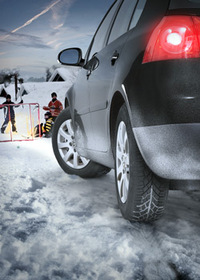Continental's Winter Tyres Do Not Lag Behind Summer Tyres At All In Terms Of Rolling Resistance
HANOVER – October 8, 2008: Contrary to common misconceptions, winter tyres have just as little rolling resistance as summer tyres. This is due to the material used, their particularly low weight and their tread design. These structural measures reduce the deformation of the tire during motoring, thereby lowering rolling resistance. Therefore, it is a false economy for drivers to put off changing their tyres – with the coldest part of the year now quickly drawing in, the braking capacity of winter tyres is markedly better than that of summer tyres.
The fact that fuel consumption is higher in winter than in the summer is attributable solely to the fact that it takes the engine longer to warm up in low temperatures.
The reduction in rolling resistance has long since been one of the main objectives in the development of modern winter tyres. The tire engineers at Continental have focused their attention on the products in the ContiEcoContact range. After all, the Hanover-based company has sold 160 million of them as original equipment and replacements over the past 15 years. They have managed to reduce rolling resistance successively from one model to the next, so that it is now some 20 per cent lower than in the tyres prior to the launch of the Eco range. Development has now moved on to the third generation model, and the previous virtually irreconcilable development conflicts between "low rolling resistance" and "grip on a wet road surface" have been resolved to a much higher degree.
"As a result of our continued development work, there is no longer any difference between summer and winter tyres in terms of rolling resistance," points out Dr. Burkhard Wies, Vice-President, Tire Line Development Worldwide at Continental. "In some of our models, the rolling resistance coefficient of around 1.0 cr in winter tyres is even slightly lower than in their summer counterparts." Therefore, Dr. Wies has a simple explanation for the higher fuel consumption that many cars experience in winter; by necessity, it takes the engine longer to warm up in winter than in the summer. As a result, higher fuel consumption in unavoidable. His advice is that if you want to do something good for the environment, you should definitely have winter tyres fitted and, if at all possible, walk occasionally, despite the poor weather.
Modern winter tyres have fine tread structures in order to interlink well with the road surface on snow which has become compacted by cars or on icy surfaces. A huge number of grip edges form. This is thanks to the large number of fine, angled incisions, so-called lamellae, on their tread blocks. At the same time, the spacing between the profile blocks still has to be big enough to disperse water quickly when driving in the rain, but not so coarse as to compromise on flexibility. Treads designed in this way, such as the tread on the new ContiWinterContact TS 830, experience barely any more deformation in contact with the ground than modern summer tyres.
The Continental Corporation is one of the top automotive suppliers worldwide. As a supplier of tires, brake systems, powertrain and chassis systems and components, instrumentation, infotainment solutions, vehicle electronics and technical elastomers, the corporation contributes towards enhanced driving safety and protection of the global climate. Continental is also a competent partner in networked automobile communication. Today, the corporation employs approximately 150,000 at nearly 200 locations in 36 countries. For further details, visit conti-online.com.
A quarter of all tires in Europe are manufactured by Continental, the market leader. When they are first manufactured, more than 30 per cent of all new European cars come out of factories fitted with Continental tires. The tire divisions are an official sponsor of the FIFA World Cup 2010™ in South Africa.



